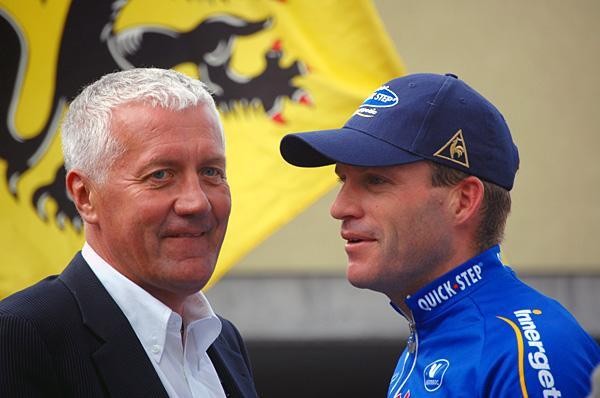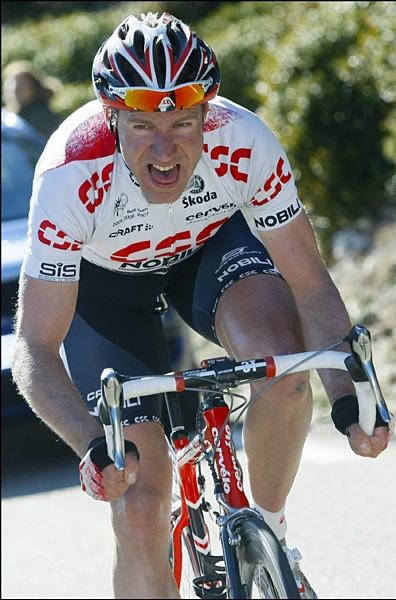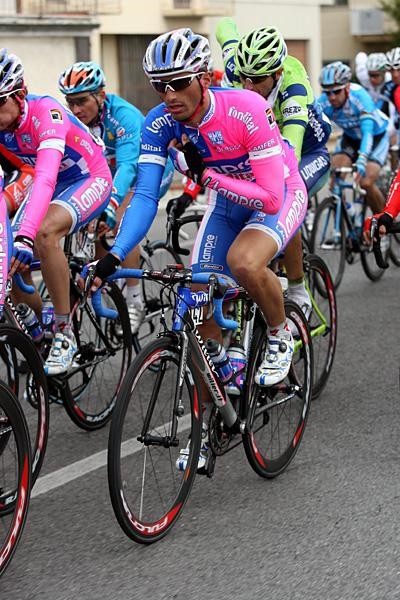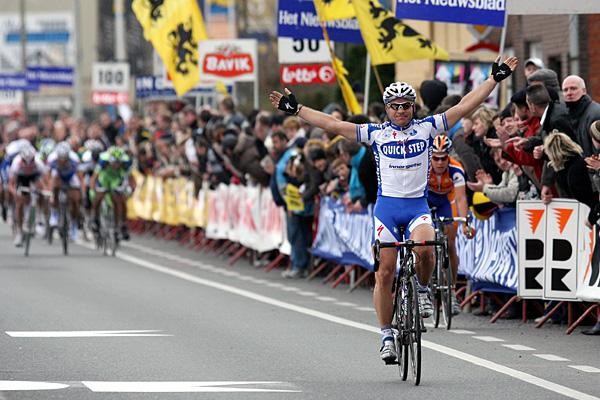Radio nowhere – Lefevere wants to keep in touch
The use of two-way radios in the sport of cycling is a hot topic of debate amongst many cycling...








News Feature, March 21, 2008
The use of two-way radios in the sport of cycling is a hot topic of debate amongst many cycling pundits. They have recently been prohibited in some Under 23 races and there is speculation that Tour de France Director Christian Prudhomme is considering a partial ban in the sport's biggest event. Cyclingnews' Bjorn Haake spoke to Quick Step Team Manager Patrick Lefevere who argued that a prohibition could be a dangerous move.
The Belgian tactician and head of arguably cycling's strongest one-day race team, Patrick Lefevere, was relaxed at the Holiday Inn Hotel in Gent, just days before the classics season was set to begin with the traditional Belgian season opener, Omloop Het Volk. Lefevere won the race himself in 1975 while riding in the Beloften (Under 23) category. Back then, race radios were unheard of and the ability to remain calm under pressure along with a tactical nous second to none was what separated an excellent rider from a good rider.
Since those good old days, the radio has been widely accepted in all categories of racing. Now, there is a push to restrict its usage again with the International Cycling Union (UCI) seemingly wanting to go back to those days. They have already banned the use of the radio in Under 23 races this season. In a rare agreement between cycling's governing body and the Amaury Sport Organisation (ASO), Christian Prudhomme the director of ASO's Tour de France, is also considering banning the radio from their event. He recently said that he is studying "the idea of banning the race radio in some of the stages of the Tour, maybe in the mountain [stages]."
Lefevere on the other hand feels that the idea of going back to racing without radios is a bad one. "The traffic situation is totally different today than it was ten years ago. When I was a sports director I could go into the bunch with the car sometimes. If you do that today, they look at you like you are a crazy guy." Although he does see advantages in being able to view his riders from a closer perspective. "It's not that I don't believe my riders, but the expression of a rider when I see him can tell me a lot more than what he tells me on the radio."
So while he would love to get up close and personal to his riders, he pointed out that in the Under 23 races, there can "be as many as 40 teams, with up to six riders," making the peloton rather large and much more dangerous in the following convoy. "Can you imagine if the director in car number 25 wants to tell his rider something?"
"The race is influenced by the radio," he admitted, but emphasised that the safety of the rider has to be considered. Some riders, like CSC's Jens Voigt, have also critised radios in the past. The German powerhouse once compared their use to making him "feel like being part of a video game" But Lefevere disagrees, arguing that sometimes the instincts of the riders may be inaccurate. "We have a lot of the information available in the car, the radio, a GPS ... but I can tell a rider to use a 53x11 and he is the one who feels it." Lefevere thinks that although radios are taking some of the guess work out of the equation for the riders there are still many aspects of traditional racing intact. "The rider are the ones who will feel if there is a hesitation [by the others] to go [on the attack].
Get The Leadout Newsletter
The latest race content, interviews, features, reviews and expert buying guides, direct to your inbox!
"Some riders hate it [the radio], because some races are boring," but he believes the races would be the same with or without the radio. Before radios, sports directors would simply find other means of collaborating, and many moves were premeditated, much like today. "I would go to other teams and say 'I am putting three guys in the break. Will you also add one?' And they would answer 'yes.'"
One drawback of two-way radios is that any team with a Smart card can access the signal and therefore the messages being relayed back and forth of other teams. "I don't believe in this. I don't like the idea that somebody listens to me," Lefevere explained. "Teams have access to a government frequency. Here in Belgium it is DOPT. You have to pay 500 euro." But he cautioned that it will differ in each country. "What is OK here, may be police [frequency] in England."
Even without intercepting another teams frequency he acknowledged "everybody knows, more or less, what the tactic will be. There are no secrets." Listening in would only be helpful "to anticipate an attack. Lefevere concluded with a smile "The racing is very simple. You have to make sure that the others are racing behind you and not vice versa."
Radios have no function if you don't have the riders to successfully carry out the tactic sent, and Lefevere's Quick Step team has the luxury problem of having numerous stars – such as Paolo Bettini, Tom Boonen, Gert Steegmans or Stijn Devolder – to utilise. "For 15 years people have been telling me that 'you have too many good riders.' But I prefer this over having to think all night who should be in the breakaway." But races are still decided on the road and not the radio, "You can have ten theories, but if there is a crash, your theory is gone. It's the riders who make the race."
This year's Omloop Het Volk was the perfect example that without the legs all the communication in the world is worth nothing as Quick Step, although highly favored to take out the title, were unable to get close to the eventual winner, Philippe Gilbert (Française des Jeux). Wouter Weylandt was their highest finisher, placing 16th, more than four minutes back. "It's the first very nervous race, it's 200 kilometres and there are a lot of hills," Lefevere had cautioned before the race. "Sometimes, that early in the season, you feel great one moment, then bad the next. You may forget to eat or drink."
But like has happened so often in the past, somtimes being beaten does a team the world of good. The day after Het Volk, Quick Step demonstrated how good team work and communication can pay dividends. The Belgian team shredded Kuurne-Brussel-Kuurne to pieces and with seven riders in the winning break of the day they stole the show as Steven De Jongh took out the sprint finish. And that, of course, is the best tactic. Keep the team together at the front and the riders don't need a radio. They can haggle over who will be the winner, without even needing to listen to their sports director.